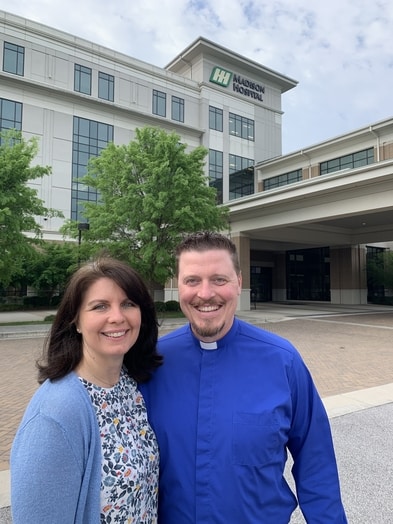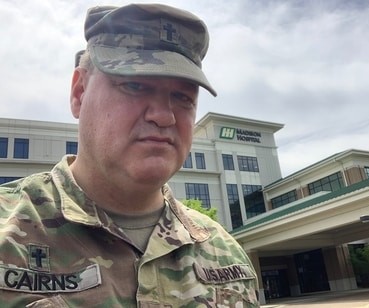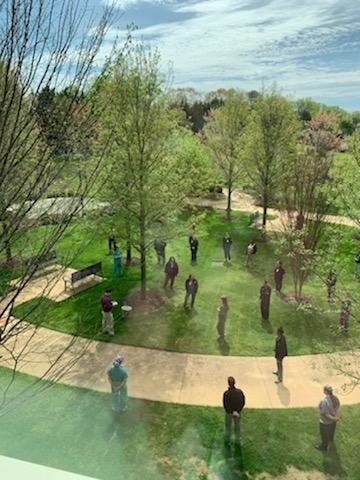
Fr. Geoff and Kelly Hatley outside Madison Hospital
“They’re definitely nervous. They are brave, but nervous about getting sick and especially about bringing it back to their families, and they’ve really appreciated the prayers.”
Fr. Geoff Hatley is Rector at St. Andrew’s in Madison, AL and a volunteer hospital chaplain. He’s been leading devotionals and prayers for hospital workers at Madison Hospital, part of the Huntsville Hospital Health System, after the head of the hospital requested chaplains minister to the entire staff during the pandemic.
“They’re on the front lines. Because they’re going to be in it every day — because they’re saturated in the virus — a lot of them [in other parts of the nation] are getting really sick because they can’t get away from it,” says Fr. Geoff. “So they know that it’s going to be bad for them. So they were extremely receptive [to the prayer times].”

Chaplain (Captain) Chris Cairns, Asst. Rector at St. Andrew’s
He helped recruit and organize pastors from the area to lead prayers each day for both morning and evening shifts. “A bunch of them were really excited about doing it,” he says.
Fr. Chris Cairns, Assistant Rector at St. Andrew’s and a military chaplain, is also leading a devotional for hospital staff once a week.
Pastors first submit to a temperature check, then lead a ten-minute Bible study and prayer time with hospital staff before they either go in for lunch or begin their shift. Right now they’re averaging about 60 out of 100 staff on each shift who have chosen to participate: “It’s the food service workers, it’s the maintenance workers, it’s everybody who’s coming in,” says Fr. Geoff.

Socially-distanced hospital workers during an outdoor prayer meeting, led by local pastors twice daily at Madison Hospital.
“I think it’s a really good idea for our clergy if they could arrange that in their areas,” he says. For his devotional time, he’s using Common Worship: Services and Prayers for the Church of England, page 94, “Prayers for Protection and Peace.”
Churches in Madison are also providing meals for hospital workers, and someone arranged a “Park and Pray” event in which people in their cars — plus police and fire department vehicles — parked outside the hospital for 20 minutes, honking their horns, flashing their lights, and setting off sirens to show support.
“The hospital staff was pretty much in tears,” says Fr. Geoff. “They were really excited about that.”
Fr. Geoff’s wife Kelly Hatley is the Hospitality and Volunteer Manager for Madison Hospital, and offers ways for churches to provide support. “We appreciate all the support, and everyone at the hospital really appreciates that the community is behind them, and it’s really been helping them to push on,” she says.
1. Bring snacks, meals, or arrange restaurant-delivered meals for hospital staff — being sure to arrange this with the Hospital Coordinator first.
Talking with your local hospital first will ensure that you can organize enough for all the staff, while not overlapping with another planned meal.
2. Include a personal note or card with items you deliver to hospital workers.
Kelly says a personal, handwritten note from adults or kids just makes the delivery special. “That was really nice to have those personal things, where they knew people went out of their way to tell them thank you or a word of encouragement.”
3. Offer to grocery shop for hospital workers in your own congregation.
“A lot of them work 12-hour shifts, so it’s hard for them to get out… and to have the energy at the end of a 12-hour shift, and all the store hours are different now,” Kelly says. “Talk to them directly and see what they need. Sometimes people don’t want to ask, or they’re too tired to even think about what they need. So making suggestions to them is a probably a good idea.”
She says offer to grab them fresh produce or other groceries while you’re making your own grocery run, then drop it off at their door with a personal note. Staff at Madison Hospital were very grateful for fresh produce they received as a donation there one day. “A lot of them were excited to have fresh food, and they’re all trying to stay healthy because they need to stay strong.”
4. Offer childcare to hospital workers in your congregation and community.
Fr. Geoff says that when the schools and daycares shutdown, it was a huge hit for hospitals. “Hospital workers have kids too. That meant there was nowhere for a lot of our hospitals to put their kids.”
He says to remember it’s not just nurses and doctors who need childcare; the entire hospital has to run. “The hospital doesn’t run if the food service folks don’t have people. Or if the maintenance and the janitors don’t work. Everyone at the hospital needs care. Especially the maintenance people – they’re not making much money, and so it’s really hard on them. And if they lose those staff the hospital can’t run, the people in the rooms can’t be fed.”
Legacy Anglican Church in Montgomery, AL has opened up its preschool as a day care only for the children of essential workers during the pandemic. Fr. Doug McCurry, Rector at Legacy Anglican, says they had 30 children enrolled immediately, followed soon by 30 more.
If your church doesn’t have a daycare to offer this help to essential workers, Kelly says college students, high school students, or anyone with the availability in a congregation can watch kids. “We’re a church family, and they probably know people they trust in their own church family who could take care of their kids.”
5. Continue to pray for hospital workers.
Reach out to people in your congregation that are working in hospitals or healthcare and ask them for specific things they need prayer for or specific physical needs. “It helps them to feel connected,” says Kelly. “A lot of them are scared, or are more scared about bringing stuff home to their families than they are about getting it themselves.”
Additionally, hospitals are under financial strain because all elective surgeries have been cancelled. “So that’s really put a strain on the finances of a lot of the people in the hospital as well,” says Fr. Geoff. Hospitals may have to cut back or make salary cuts, “so they’re going to be under some strain there just like everybody else.”

by Rachel Moorman
Communications Associate
news@adots.org
